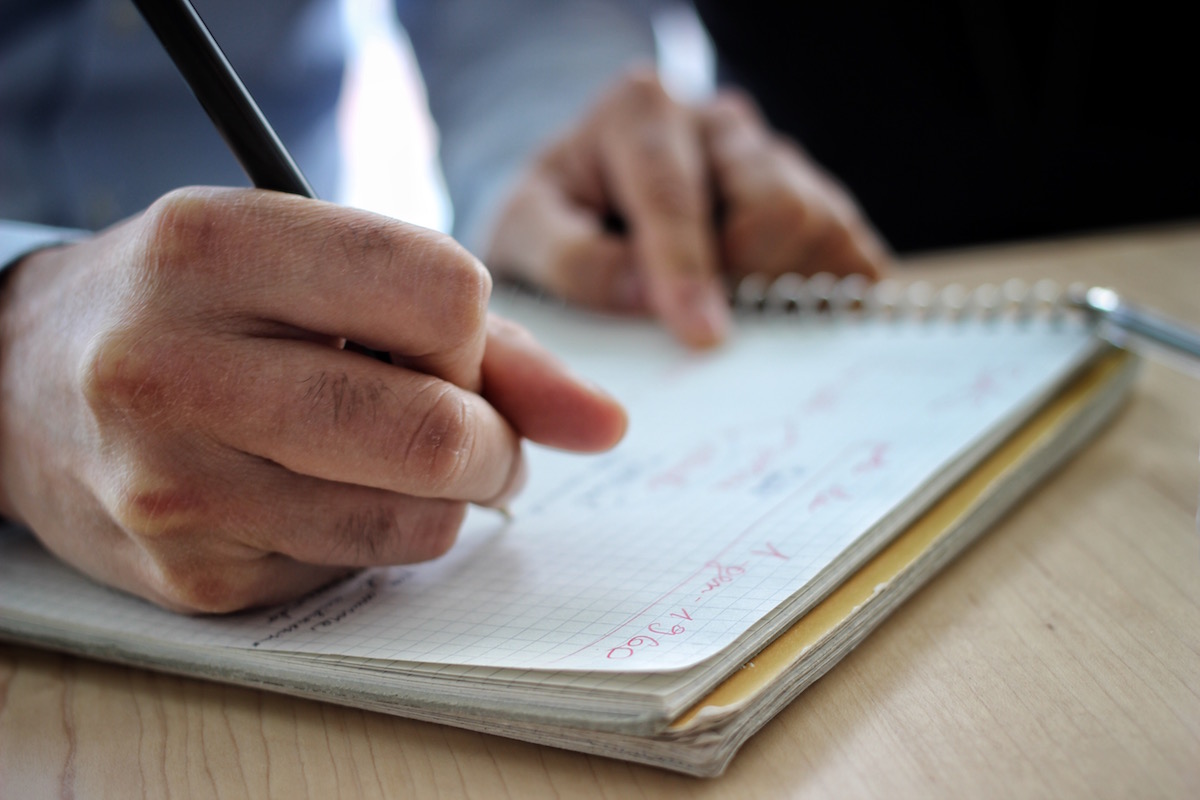
04 Sep What Are 5 Tips for Taking Effective Deposition Notes?
Mastering the Art of Effective Deposition Note-Taking: 5 Invaluable Tips
In the legal world, the significance of effective deposition note-taking cannot be overstated. Depositions serve as a critical part of the discovery process within legal proceedings, and the precision of your notes can make or break a case. In this article will educate you on depositions and offer you five tips for taking effective deposition notes that will empower you.
We will cover:
- Preparing
- Using The Right Language
- Key Details
- Being Impartial
- Organization
Prepare Thoroughly For A Deposition
Before embarking on the deposition process, thorough preparation is the cornerstone of success. Dive into the case with zeal, immerse yourself in the relevant documents, and gain a comprehensive understanding of the legal intricacies at play. Such thorough groundwork equips you to anticipate the trajectory of the deposition, allowing you to formulate precise and strategic questions that will yield valuable information.
Employ Clear and Concise Language
Throughout the deposition, it’s imperative to wield clear and concise language both in your questions and notes. Eschew the temptation to employ legalese and convoluted terminology. By doing so, you ensure that your notes are comprehensible not only to yourself but also to anyone else who may need to reference them during trials or negotiations. Simplicity is key.
Zero In on Key Details
While summarizing the essence of the testimony is undoubtedly important, your focus should always be on capturing the crucial details. This includes dates, names, specific events, and any minutiae that may seem inconsequential at the moment but could play a pivotal role in the later stages of the legal process. Your ability to record these specifics accurately is a testament to your competence.
Maintain Impartiality
One of the cardinal rules of deposition note-taking is to remain impartial. Your role is that of an objective observer, faithfully recording the witness’s statements without any personal biases or opinions creeping into your notes. Impartiality is the bedrock upon which your credibility in court stands, and it’s a quality that should never be compromised.
Organize Your Deposition Notes Systematically
The effectiveness of your deposition notes extends beyond mere accuracy; it also hinges on how well-organized they are. Implement a systematic approach by categorizing information with the aid of headings and subheadings. Consider taking it a step further by creating a table of contents, affording you swift access to specific sections of your notes. Organization isn’t just a bonus; it’s a necessity.
The Importance Of Taking Deposition Notes
As a lawyer, you are responsible for keeping impeccable records of information. Depositions are a critical phase in the legal process where witnesses, including your client, provide sworn testimony under oath. During this process, your primary goal is to gather as much information as possible to aid in building your case or defending your client.
Here’s why taking effective deposition notes is not only beneficial but vital.
- Memory Aid. Depositions can be lengthy, and the questions asked may cover a wide range of topics. Your lawyer takes notes to ensure they have an accurate record of what was said. This helps them recall specific details and any potential inconsistencies in the witness’s testimony.
- Preparation. Your lawyer will use the notes taken during your deposition to prepare for trial or settlement negotiations. These notes will serve as a reference guide, allowing your lawyer to identify key points to emphasize or areas to challenge during the trial.
- Documenting Responses. Depositions are part of the discovery process, where both sides aim to gather information to support their cases. Your lawyer’s notes help document your responses to the opposing counsel’s questions, ensuring that your testimony is accurately recorded.
- Cross-Examination. If you are a witness in someone else’s case, your lawyer may take notes to prepare for cross-examination. This involves questioning you about your deposition testimony to highlight favorable information or challenge inconsistencies.
- Legal Strategy. Your lawyer’s notes may contain strategic insights on how to approach your case. They may use these notes to assess the strengths and weaknesses of your testimony and determine the best course of action moving forward.
It’s essential to remember that as an attorney, you are there to represent your client’s interests and protect their rights during the deposition. Your notes are a valuable tool in achieving these objectives. If your client has any concerns or questions about the deposition process, be sure to discuss them beforehand to ensure you and them are well-prepared and comfortable during the proceedings.
Conclusion
In the intricate world of law, the skill of effective deposition note-taking holds significant sway over the outcome of legal proceedings. By embracing and diligently implementing these five invaluable tips, you’ll not only enhance your note-taking capabilities but also contribute substantially to the success of your legal cases. Remember, meticulous preparation, unwavering clarity, and impeccable organization are your allies on this journey.
Related Questions
What is the ideal length for deposition notes?
There’s no one-size-fits-all answer to this question. Instead of fixating on length, focus on capturing pertinent information accurately. Quality over quantity is the rule of thumb.
Can I use a recording device during a deposition?
The permissibility of recording devices during depositions depends on local regulations and the consent of all involved parties. Prior to recording, always ensure compliance with the relevant rules and seek consent if necessary.
What should I do if a witness refuses to answer a question during a deposition?
In the event of a witness refusing to answer, it’s advisable to consult with the presiding judge or their attorney. They will determine the appropriate course of action, which may involve proceeding with the deposition or seeking a court order to compel the witness to respond.
Is it better to take handwritten or digital notes during a deposition?
Both handwritten and digital note-taking methods are acceptable. The choice between them should be based on your personal comfort and efficiency. What matters most is the clarity and organization of your notes.
How can I increase my note-taking speed during a deposition?
Speed in note-taking can be honed through practice. Familiarize yourself with shorthand techniques and consider developing a system of abbreviations and symbols that work best for you.







